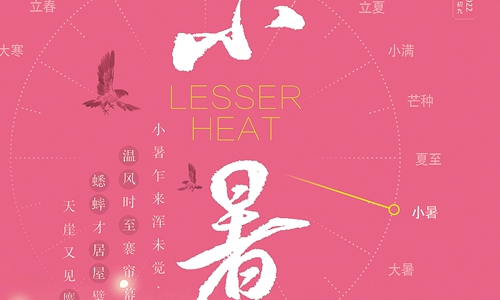The 24 Solar Terms
Created in ancient times, the 24 Solar Terms are part of China's calendar system, indicating the law of seasonal changes. The 24 Solar Terms were established according to the change of the Earth's position on the ecliptic (the orbit on which the Earth rotates around the sun). Starting from the zero degree on the ecliptic longitude, every 15 degrees the sun moves forward are called "a solar term." Every year, it rotates 360 degrees for 24 solar terms. Since they reflect the movement of the sun, they are basically fixed dates according to the current Georgian calendar.
The 24 Solar Terms were first invented in the Shang Dynasty (C.1600BC-1046BC), but they were not completely established until the Western Han Dynasty (206BC-AD25). They originated from the Yellow River basin, a historical agricultural center, based on its climate and natural phenomena. They helped guide the agricultural production in seeding, harvesting and other activities as well as people's daily life in such aspects as food, clothing, housing and transportation.
The 24 Solar Terms are as follows:
The Beginning of Spring, Rain Water, the Waking of Insects, the Spring Equinox, Qingming, Grain Rain, the Beginning of Summer, Grain Full, Grain in Ear, the Summer Solstice, Lesser Heat, Greater Heat, the Beginning of Autumn, the Limit of Heat, White Dew, the Autumnal Equinox, Cold Dew, Frost's Descent, the Beginning of Winter, Lesser Snow, Greater Snow, the Winter Solstice, Lesser Cold, and Greater Cold.
The 24 Solar Terms are very influential and popular in China even now. They are closely connected with local customs and some of them have become fixed festivals. For example, on the Summer Solstice, people in the north eat cold noodles. From this day forward, people tend to eat light, get up early and do exercises in the early morning or late evening to avoid the heat. They embody the concepts of respect for nature, and harmony between man and nature.
The 24 Solar Terms were also introduced to Korea, Japan and other neighboring nations in ancient times. Known as "China's fifth great invention," the 24 Solar Terms were listed in China as a national intangible cultural heritage in 2006, and inscribed by UNESCO on the Representative List of the Intangible Cultural Heritage of Humanity in 2016.
Global Times

Created in ancient times, the 24 Solar Terms are part of China's calendar system, indicating the law of seasonal changes. The 24 Solar Terms were established according to the change of the Earth's position on the ecliptic (the orbit on which the Earth rotates around the sun). Starting from the zero degree on the ecliptic longitude, every 15 degrees the sun moves forward are called "a solar term." Every year, it rotates 360 degrees for 24 solar terms. Since they reflect the movement of the sun, they are basically fixed dates according to the current Georgian calendar.
The 24 Solar Terms were first invented in the Shang Dynasty (C.1600BC-1046BC), but they were not completely established until the Western Han Dynasty (206BC-AD25). They originated from the Yellow River basin, a historical agricultural center, based on its climate and natural phenomena. They helped guide the agricultural production in seeding, harvesting and other activities as well as people's daily life in such aspects as food, clothing, housing and transportation.
The 24 Solar Terms are as follows:
The Beginning of Spring, Rain Water, the Waking of Insects, the Spring Equinox, Qingming, Grain Rain, the Beginning of Summer, Grain Full, Grain in Ear, the Summer Solstice, Lesser Heat, Greater Heat, the Beginning of Autumn, the Limit of Heat, White Dew, the Autumnal Equinox, Cold Dew, Frost's Descent, the Beginning of Winter, Lesser Snow, Greater Snow, the Winter Solstice, Lesser Cold, and Greater Cold.
The 24 Solar Terms are very influential and popular in China even now. They are closely connected with local customs and some of them have become fixed festivals. For example, on the Summer Solstice, people in the north eat cold noodles. From this day forward, people tend to eat light, get up early and do exercises in the early morning or late evening to avoid the heat. They embody the concepts of respect for nature, and harmony between man and nature.
The 24 Solar Terms were also introduced to Korea, Japan and other neighboring nations in ancient times. Known as "China's fifth great invention," the 24 Solar Terms were listed in China as a national intangible cultural heritage in 2006, and inscribed by UNESCO on the Representative List of the Intangible Cultural Heritage of Humanity in 2016.
Global Times

A creative illustration of the Solar Term Lesser Heat, which falls on July 7 Illustration: Global Times


